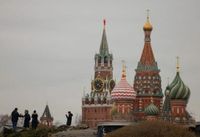In a significant development in international relations, Kremlin spokesman Dmitry Peskov announced on April 28, 2025, that Russia is prepared to provide military assistance to North Korea if necessary. This declaration underscores the strengthening ties between the two nations amid ongoing tensions in Eastern Europe.
Peskov emphasized that the strategic partnership between Russia and North Korea, formalized through a comprehensive treaty, allows for mutual support in times of need. He stated, "Of course, we have a valid treaty, and under this treaty, both parties (Russia and the Democratic People's Republic of Korea) can provide assistance to each other if necessary." This statement reflects the deepening military and political cooperation between the two countries.
The context of this announcement comes after North Korean soldiers reportedly participated in military operations in the Kursk region of Russia. This involvement was first acknowledged by Russian officials on April 27, 2025, when they confirmed that North Korean troops had been deployed to assist in combat against Ukrainian forces. Peskov noted that the North Korean military's role in the conflict has demonstrated the effectiveness of the strategic partnership established last year between Russian President Vladimir Putin and North Korean leader Kim Jong-un.
According to reports from the Korean Central News Agency, North Korea dispatched troops to Russia specifically under the defense cooperation agreement with Moscow, an action described as being ordered by Kim Jong-un himself. The agency stated that "sub-units" of the North Korean armed forces took part in operations aimed at liberating territories in Kursk, claiming that their military efforts were successful.
This unfolding situation raises questions about the implications of such military collaboration. Analysts suggest that the involvement of North Korean forces in Russia could be a strategic move to bolster military capabilities amid the ongoing conflict in Ukraine, which has seen significant territorial disputes since August 2024. The Ukrainian forces have made inroads into Russian-held territories, prompting a response from Moscow.
Furthermore, Peskov's comments indicate that Russia views North Korea not just as a regional ally but as an essential partner in its military strategy. The Kremlin's willingness to reciprocate assistance to North Korea if the need arises highlights a shift in geopolitical alliances in the region. Peskov noted, "If necessary, Russia can also assist North Korea. This mutual support is a cornerstone of our partnership."
As the situation develops, the international community is closely monitoring these military interactions. The partnership between Russia and North Korea, particularly in a military context, could have significant ramifications for regional security dynamics. Observers are particularly concerned about the potential for increased military cooperation leading to heightened tensions in the Asia-Pacific region.
The Kremlin's announcement also comes at a time when global geopolitical tensions are already high, with various nations reassessing their alliances and defense strategies. The collaboration between Russia and North Korea could be interpreted as a counterbalance to Western influence in the region, particularly given the ongoing support that Western nations provide to Ukraine.
In light of these developments, the Kremlin's relationship with Pyongyang is likely to be scrutinized by other nations, particularly those in the Asia-Pacific region. North Korea's military actions and alliances are often viewed through the prism of its ongoing tensions with South Korea and the United States.
In conclusion, the potential for increased military collaboration between Russia and North Korea marks a notable shift in the geopolitical landscape. As both nations navigate the complexities of their strategic partnership, the implications for international security and regional stability remain to be seen.




